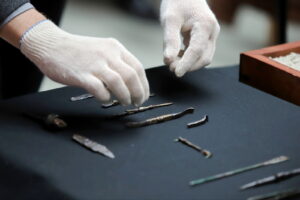 BUDAPEST, HUNGARY—Telex reports that archaeologists unearthed the first-century A.D. tomb of a Roman physician in a central Hungarian necropolis. He was buried during the period when the Roman imperial province of Pannonia was being formed. Placed at the feet of the man, who died between the ages of 50 and 60, were two wooden boxes containing medical instruments, including needles, pincers, and silver-plated copper alloy scalpels that were fitted with interchangeable steel blades. A muller found near the man’s knee was likely used to mix herbs and other medicinal substances. Eötvös Loránd University archaeologist Levente Samu said that the high-quality equipment would have been suitable for performing complex medical procedures. The team is planning to conduct isotope analysis and DNA testing to determine the doctor’s place of origin
BUDAPEST, HUNGARY—Telex reports that archaeologists unearthed the first-century A.D. tomb of a Roman physician in a central Hungarian necropolis. He was buried during the period when the Roman imperial province of Pannonia was being formed. Placed at the feet of the man, who died between the ages of 50 and 60, were two wooden boxes containing medical instruments, including needles, pincers, and silver-plated copper alloy scalpels that were fitted with interchangeable steel blades. A muller found near the man’s knee was likely used to mix herbs and other medicinal substances. Eötvös Loránd University archaeologist Levente Samu said that the high-quality equipment would have been suitable for performing complex medical procedures. The team is planning to conduct isotope analysis and DNA testing to determine the doctor’s place of origin















